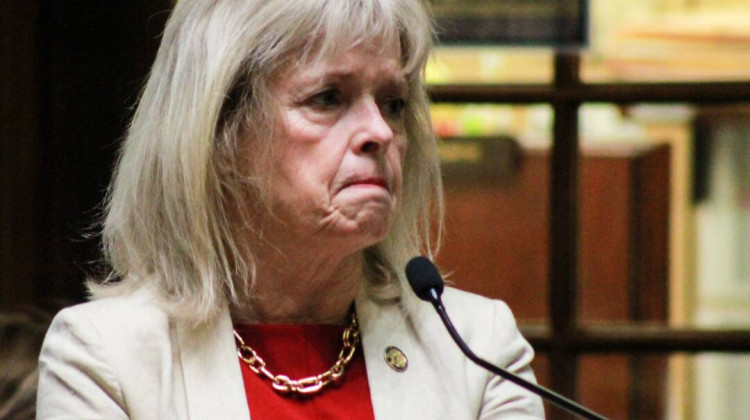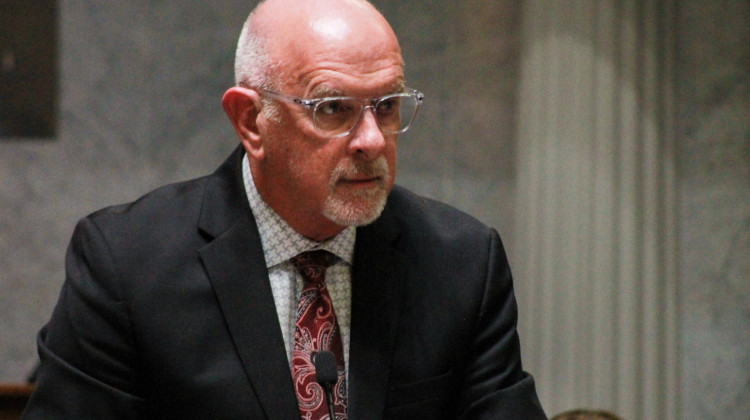
Indiana legislators passed more than 170 new laws this year and the vast majority take effect July 1.
Lauren Chapman/IPB NewsIndiana legislators passed more than 170 new laws this year and the vast majority take effect July 1. Here are some of the laws we followed during the legislative session taking effect.
One of the year’s highest-profile measures was a $1 billion tax cut package. The bulk of those cuts take effect in future years. But lawmakers eliminated two utility taxes that will save the average Hoosiers a couple dollars a month, after July 1.
HEA 1296: Permitless handgun carry
Previously, if you wanted to carry a handgun in public in Indiana, you needed to get a permit from the state to do so. That involved submitting to a background check by the Indiana State Police and fingerprinting. But HEA 1296 eliminates that permit.
Among other things, the new law moves up the deadline to 2024 for counties to add a critical election security measure to their voting machines. Election security experts widely agree that electronic voting machines should use “voter verifiable paper audit trails,” or VVPATs. That’s a paper backup that allows counties to conduct post-election audits and helps voters check that they’re casting their ballot for who they intended.
Counties must also enter into a cybersecurity agreement with the Secretary of State's office for the purposes of election security, but only if they get money from the state or federal government to do so. And from now on, if you submit an application for an absentee ballot online, you must include either your driver's license number or the last four of your Social Security number.
The measure creates a new, specific crime against coerced abortion. The law says if abortion care providers even suspect a person is being coerced, they must immediately call the police, who then must immediately investigate.
SEA 62: Tax sales to nonprofits
The measure, SEA 62, could help preserve affordable housing by setting aside a portion of tax sale properties for nonprofits to acquire. That, in turn, could help owners stay in their homes or rehab homes for low-income families.
HEA 1130: School board public comment
Local school boards must provide a public comment period before they take action at their meetings. That comes in response to a small number of boards over the past year who refused to allow public comment.
Join the conversation and sign up for the Indiana Two-Way. Text "Indiana" to 73224. Your comments and questions in response to our weekly text help us find the answers you need on statewide issues.
Education
HEA 1041: Transgender girls athletes
After lawmakers overrode the governor’s veto during their one-day technical session, HEA 1041 will go into effect on July 1. The ACLU of Indiana filed a lawsuit immediately following the veto override to halt the bill from going into effect.
HEA 1093: School resource officer training loophole
The new law requires all police who regularly work inside public schools during regular hours to undergo basic school resource officer training. That training would include lessons on adolescent brain development, how to interact with students with disabilities and understanding racial biases, among other issues.
SEA 82 requires a notice about Free Application for Federal Student Aid, or FAFSA and its importance be posted online by the Commission for Higher Education, and that schools send families notice too. Families would be able to respond to that notice indicating whether or not they plan to file the FAFSA and if they want help with it. While this new law goes into effect July 1, the schools don’t have to send the notice until the 2022-23 school year.
Criminal justice
SEA 294: Civilian members on Indiana Law Enforcement Training Board
SEA 294 adds the leaders of academies across Indiana to the Indiana Law Enforcement Training Board, in an effort to make sure officers are getting the same training no matter which academy they attend. The bill also adds civilians to the board for the first time.
HEA 1300, SEA 7 and SEA 9: Crime bill package
The package of new laws aim to address multiple areas of the criminal justice system including bail, electronic monitoring and violent crime reduction. A federal judge denied a motion on June 29 to stop the law that blocks charitable organizations from paying a person's bail to get them out of jail.
HEA 1004: Low level felony treatment programs
People convicted of low-level, non-violent felonies can now be put in the state’s prison system, instead of local jails. That reversal of state policy comes as county jails struggle to provide adequate mental health and addiction services.
SEA 304: Township trustee removal
Supporters of the new law say it is in response to the actions of trustees in Tippecanoe County’s Wabash and Fairfield Townships who acted with little oversight or accountability.
In Wabash Township, now-former Trustee Jennifer Teising faced questions regarding her residency. In January, Teising was found guilty by Judge Kristen McVey on 21 counts of theft for illegally taking her trustee salary while not a resident of the township.
Environment and energy
SEA 271: Small nuclear reactors
The new law makes it easier for smaller, more advanced nuclear power plants to be built in Indiana. Supporters say these plants provide reliable, clean power — and their small size makes them cheaper and safer.
But environmental groups and consumer advocates said small modular nuclear reactors are a risky investment for the state. None of the planned modular nuclear reactors have been built yet and many have gone over their proposed budgets — some by billions of dollars. The Union of Concerned Scientists has also questioned the safety of the plants. It said the nuclear industry has sometimes used the plant’s smaller size to justify cutting back on safety equipment and staff as well as shrink the area that would be told to evacuate in a disaster. The U.S. also hasn’t found a way to safely store nuclear waste long-term, so most of that waste would remain on the site of the plants.
SEA 147: Underground pumped storage hydropower
SEA 147 adds this type of energy storage to the state’s list of clean energy resources. The technology generates energy by passing water through a turbine as it moves from a higher reservoir to a lower one. It accounts for most utility-scale energy storage in the U.S., but hasn’t been used much in Indiana — which has fewer of the hills and valleys needed to create the two reservoirs. But supporters of the law said abandoned mines and quarries in Indiana could allow the state to use this technology — and bring economic opportunity to those areas.
HEA 1209: Carbon sequestration projects
The measure allows companies that pollute to capture their carbon emissions and store them underground. Among other things, the bill would require companies to get permission from owners of 70 percent of the land area and compensate those who don’t consent. Those property owners wouldn’t be allowed to sue for punitive damages as long as the company complies with its permit. Some environmental advocates say underground carbon storage doesn’t address the source of the CO2 and has the potential to contaminate drinking water or cause earthquakes.
After the underground storage facility has closed, the state would assume liability for the CO2 — something the Indiana Department of Natural Resources and some lawmakers aren’t comfortable with. However, Senate Bill 265 – which would have removed some liability for Wabash Valley Resources LLC in Terre Haute to store carbon emissions underground through a state pilot program – did not pass.
SEA 411: Commercial solar and wind energy
SEA 411 sets state guidelines for where wind and solar farms can be located. Any county or township that adopts the standards — or less stringent ones — for things like how far a wind turbine or solar farm can be from a home would be deemed a wind or solar ready community. But the incentives to get that title were stripped from the law.
The original measure would have given counties $1 for every megawatt hour of energy generated by a renewable energy project, every year for a decade — boosting revenues for rural areas in the state. A sponsor of the law suggested that funding could be added into the state’s budget next year.
HEA 1147 and SEA 129: Seed tests
These new laws charge farmers more money to get their seed tested by the state. The Office of Indiana State Chemist offers to test seed for purity and germination, but only charges about half as much as what private companies do. Officials with the agency say that makes it harder for them to provide that service. Among other things, the new laws allow the state chemist to keep fees in line with industry standards and change them more often.
The new law reduces the number of dams that are under the Indiana Department of Natural Resources’ jurisdiction, but also requires those who own high hazard dams to make an emergency action plan. Lawmakers behind SEA 269 said people who own the dams have had to pay to maintain them to the state’s standards. That can sometimes lead to years-long lawsuits against the Indiana Department of Natural Resources, costing taxpayers money. But some engineers and environmentalists have said now isn’t the time to decrease state oversight of dams. Many dams in Indiana are old and in danger of failing.
Contact reporter Brandon at bsmith@ipbs.org or follow him on Twitter at @brandonjsmith5.
 DONATE
DONATE






 Support WFYI. We can't do it without you.
Support WFYI. We can't do it without you.